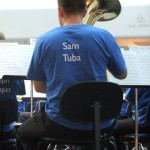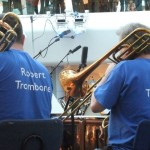By Brian Taylor Goldstein, Esq.
As the U.S. Legal Advisor to the International Artist Managers’ Association (IAMA), I’ve been asked to prepare an update on a variety of current issues involving international touring at the next membership meeting in London on November 27, 2015. Not only do I adore IAMA, but as this would provide a lovely excuse for my wife and I to avoid having to spend Thanksgiving with either of our families, I was more than happy to agree. Robyn Guilliams and prepared this report, I thought I would share it with all of you…
Visa Stercus
1. USCIS is presently taking a minimum of 8 – 10 weeks to process visa petitions at both the Vermont and California Service Centers. This means that, as of today, if you need to have an artist enter the U.S. any earlier than March 2016, you need to pay the additional $1225 for premium processing. (The official visa processing times that USCIS posts on its website have always been purely propaganda and should always be disregarded as such.)
- As a reminder, visa petitions can be filed up to one year in advance of the performance date.
2. For those of you who have Canadian musicians eligible for P-2 visas, we are receiving reports that Canadian AFM is experiencing a backlog in preparing filing petitions. This is in addition to the current USCIS processing time of 8 – 10 weeks.
3. I’ve said this before, but the message not getting through, so its worth repeating. ARTISTS CANNOT DO ANYTHING IN THE U.S. ON A TOURIST VISA OR ESTA (Visa waiver) STATUS!! Please stop listening to the colleges, universities, and festivals that tell you otherwise. They have nothing to lose other than perhaps having to find a replacement artist. On the other hand, I have recently learned of two artists—one from Germany and the other from Spain—who have had their ESTA status permanently revoked because they tried to enter the U.S. in ESTA status to perform in the U.S. Both artists had entered multiple times in the past and one were merely entering to “perform” a master class.
- It doesn’t matter whether an artist is paid or unpaid, whether the concert is free, or whether the performance is for educational purposes. They must have an appropriate visa—most often an O or P visa. United States Immigration Officers are taking this very seriously.
4. In preparing visa petitions, please start collecting and providing the evidence USCIS wants as opposed to giving them what you have lying around in your press package. The days of being able to supply a bio and a few press articles are long gone and we are seeing more and more visa denials and delays because of this.
- I recently, and with much regret and sadness, had to advise a client to re-cast a role because the artist’s European management was simply refusing to cooperate in our efforts to obtain a visa for the artist. (In case that manager is reading this…no, USCIS will not “just google the artist to find out how famous he is!”)
Tax Stercus
1. For those of you waiting to receive a refund check from the Internal Revenue Service (IRS) for a non-U.S. artist who has had 30% withheld from their gross engagements fees and are due a tax refund, please be advised: the check is NOT in the mail, and won’t be for the foreseeable future. The IRS has added an extra layer of scrutiny to nonresident tax returns involving refunds. Aside from the usual 2 to 3 month processing time, there is a second review to be sure that everything on the 1042-S form is accurate and complete. If the IRS senses ANYTHING off, the taxpayer will receive a letter asking for more info. To be fair, the IRS has announced that it will be paying interest on all overdue refund checks. To be practical, it doesn’t matter how much interest they offer to pay if, in fact, they never issue the refund.
- Bottom Line: There is currently a very good chance that if 30% is withheld from an artist’s engagement fee, the artist will not get that money back…or, at least, not for the foreseeable future. Please plan cash flow accordingly.
2. A Central Withholding Agreement (CWA) is still the best way of avoiding or reducing the mandatory 30% withholding required from all engagement fees for non-U.S. artists. To be eligible for a CWA, among other requirements, an artist must have filed a U.S. tax return for each prior year in which they have ever performed in the U.S.– even where no tax was owned. If an artist has not filed past U.S. tax returns, he or she will be required to file them as a prerequisite to obtaining a CWA. Unfortunately, we are seeing a sharp increase in the instances where filing such past tax returns is triggering an IRS audit in which they are requesting documents and records from the artist’s world-wide income.
- In this one particular area, the IRS has displayed a remarkable degree of efficiency in identifying artists who have simultaneously made the least amount of money and kept the least amount of records to prove it.
3. Obtaining Social Security Numbers (SSNs) and Individual Tax Payer Identification Numbers (ITINs) continue to be a challenge. While SSSs are not any easier for an artist to obtain, they have not become harder. ITINs, on the other hand, have become increasingly difficult, if not impossible, to get. Despite both staffing and budget cutbacks, the IRS has been requested to scrutinize ITIN requests more closely—particularly with regard to proof of identity. For most non-US residents, the most obvious and best proof of identity is a copy of their passport. However, the IRS lacks the resources and training to evaluate how to tell legitimate passports from forged ones. As a result, the IRS is now only accepting copies of passports that have been certified by the actual agency that issued the passport. However, even when this is provided, we are seeing the IRS send notices requesting that the actual, physical passport be sent to them instead. DO NOT DO THIS! You will never see that passport again!
- There IS one option for some Europeans: There are IRS offices located in the U.S. Consulates in Paris and London. One can go to these offices and request an ITIN in person (with an original passport, which the IRS will review and return on the spot.) HOWEVER – one can obtain an ITIN only if one has an “immediate tax need”, such as filing a return. So, if requesting an ITIN in the Paris or London Consulates, one must also bring a completed tax return in hand, ready to file.
4. We are seeing a large number of U.S. presenters–especially those based at colleges and universities—insisting that non-U.S. artists are legally required to have either a SSN or ITIN in order to perform or get paid in the U.S. Please be advised: There is no such law! While such numbers may make book keeping and accounting easier for the presenter, there is no law that requires an artist to have either one. Not only are SSNs and ITINs not proof of work authorization, but as we addressed above, many artists will be unable to get them in advance—if ever.
5. Canada requires 15% withholding for gross engagement fees of non-Canadian performers performing there (similar to the 30% withholding requirement in the U,S.) Canada Revenue allows performers to file a waiver/reduction request to reduce/waive the withholding (an R-105 request). On their website, Canada Revenue indicates that the deadline for filing such a request is 30 days prior to the first payment due. However, it’s taking them MUCH longer to process the requests. So, we are recommending that you file your request with them AT LEAST 60 days prior, or earlier, if possible.
General Travel Stercus
1. There is nothing new to report with regard to the ban on bringing musical instruments into the U.S. that contain ivory or other protected materials. United States Customs and Border Patrol isn’t strictly enforcing this with any degree of regularity. However, if any orchestras are touring and don’t want to take the risk, we are recommending that they contact Heather Noonan (hnoonan@americanorchestras.org) at the League of American Orchestras (http://americanorchestras.org) who is among the leading and most effective legislative arts advocates in the U.S. and is happy to talk to them about the “Instrument Passport” process.
- The League and others are continuing to lobby for specific amendments, including exemptions to the rules for “personal effects” (which would include carry-on musical instruments).
2. There has been some recent concern about Amtrak, the U.S.’s ersatz rail service, implementing a new policy requiring additional seats to be purchased for oversize musical instruments which cannot fit into overhead compartments. To date, this policy has been posted, but not enforced. We are recommending that artists and ensembles that intend to use Amtrak to travel to engagements within the U.S. check with an Amtrak representative in advance of the tour…and then be prepared for whatever they are told in advance to then be either incorrect or disputed by Amtrak at the actual time of travel.
Other Stercus
1. When negotiating fees for U.S. engagements, please remember to specify the currency in which the artist is to be paid, including exactly how and when the exchange rate is to be calculated. We are seeing an increased number of misunderstandings over this point.
- At the same time, use this as an opportunity to clarify any other costs or deductions (such as taxes, visas costs, hotel, travel, etc.) which either are or are not to be included as part of the engagement fee.
2. Too many people are still relying on general, vague, boilerplate, or unspecific contractual language to take the place of actual negotiation. Do not rely on the misguided belief that there are standard legal terms and procedures that magically govern engagements and bookings when words fail. If you want something, or don’t want something, say something—or, preferably, write it down.
3. When dealing with performances of new works or contemporary music, bear in mind that licensing laws differ. What’s in the public domain in Europe may not be in the United States. Even a re-arrangement or re-orchestration may not be permissible in certain countries.
__________________________________________________________________
For additional information and resources on this and other legal, project management, and business issues for the performing arts, visit ggartslaw.com
legal, project management, and business issues for the performing arts, visit ggartslaw.com
To ask your own question, write to lawanddisorder@musicalamerica.com
All questions on any topic related to legal, management, and business issues will be welcome. However, please post only general questions or hypotheticals. GG Arts Law reserves the right to alter, edit or, amend questions to focus on specific issues or to avoid names, circumstances, or any information that could be used to identify or embarrass a specific individual or organization. All questions will be posted anonymously and/or posthumously.
__________________________________________________________________
THE OFFICIAL DISCLAIMER:
THIS IS NOT LEGAL ADVICE!
The purpose of this blog is to provide general advice and guidance, not legal advice. Please consult with an attorney familiar with your specific circumstances, facts, challenges, medications, psychiatric disorders, past-lives, karmic debt, and anything else that may impact your situation before drawing any conclusions, deciding upon a course of action, sending a nasty email, filing a lawsuit, or doing anything rash!


